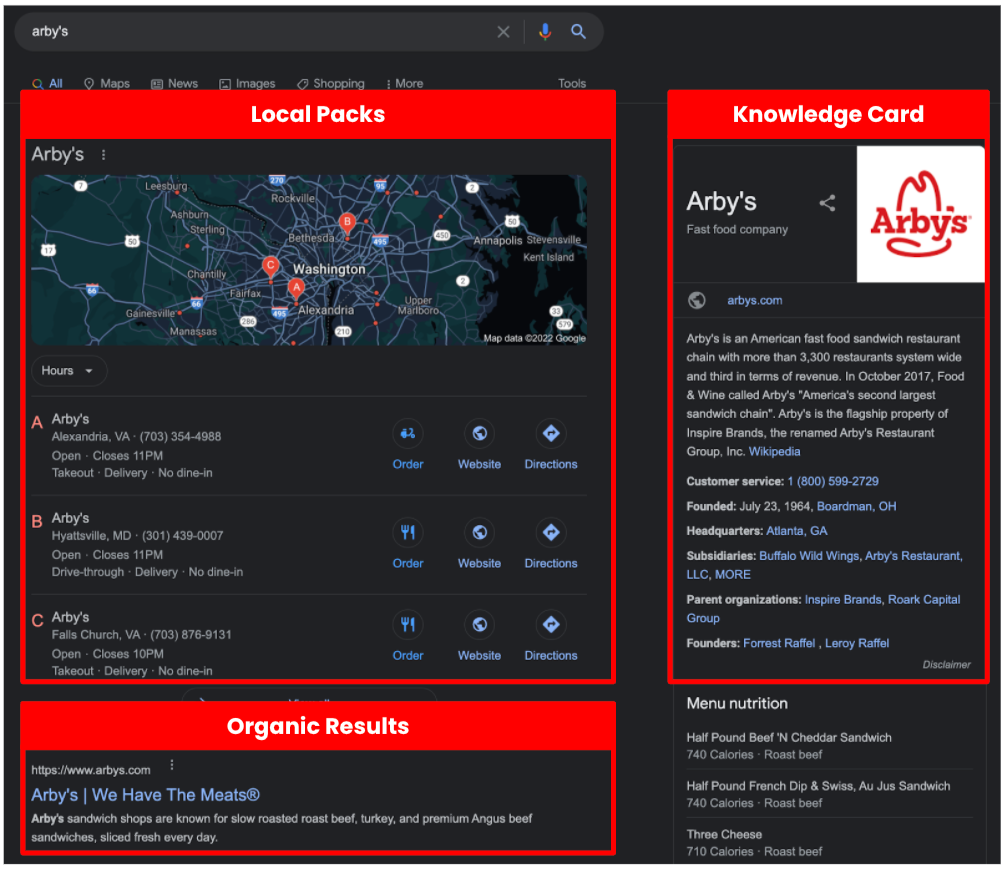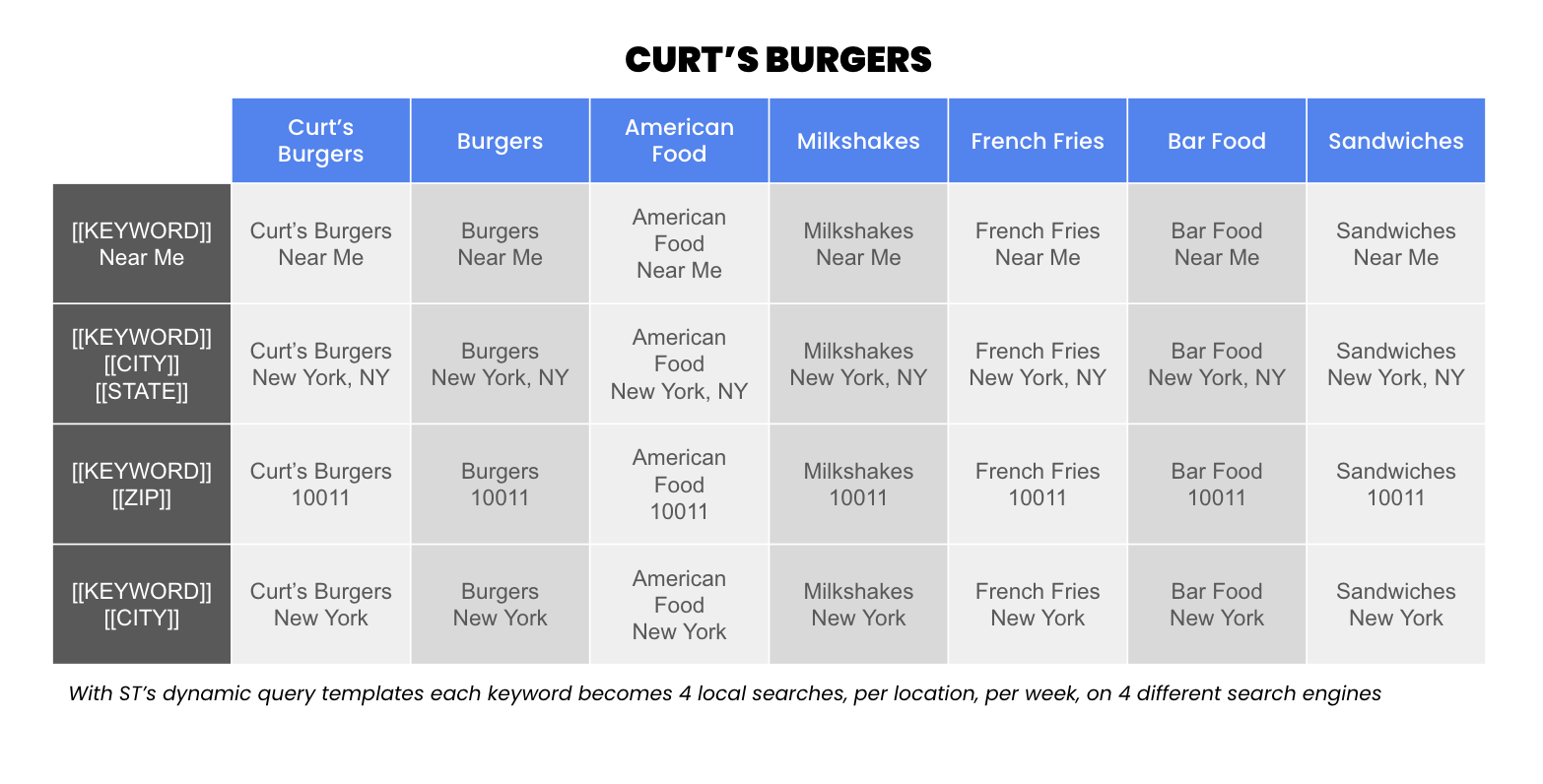How to Improve Your Rank with the Search Tracker
Author: Curtis Maher, Platform Product Marketing
Blog Date: March 2022
The Evolution of the Search Engine Results Page
When search engines were first introduced, they were a tool that helped people locate web pages online. Based on keywords in their search, users would expect to see a set of 10 blue links ordered by relevance in the Search Engine Results Page (SERP). The ranking was simple and easy to measure, and for businesses thinking about their presence in search, there was a clear objective: to rank at the top of the SERP. The accompanying practice of Search Engine Optimization (SEO) was shaped by this attention to the ranking of organic search results.
As search engines matured, they became a more intelligent and versatile tool. Today, users can expect to not only find relevant links, they can actually find direct answers to their questions. Alongside developments in Natural Language Processing (NLP) technology, this was made possible by the evolution of the SERP. In addition to basic URL links, we've become accustomed to a results page that reflects natural language understanding and includes a mix of content – including Knowledge Cards, Map Data (Local Packs), and more.

This advancement has given businesses an even greater opportunity to reach their customers and drive conversions, but it's also made it more difficult to measure performance in search.
Organic blue links still matter, but now they are only one piece of the puzzle. SEO strategists need to be able to track and make sense of all types of results appearing in the SERP. Yet, this isn't as straightforward as it used to be — how can you measure success with all of the different ways your brand is appearing in search? Yext's Search Tracker is built to help brands measure their performance in modern SERPs and make informed improvements to their digital strategy.
How It Works
Search Tracker makes it easy to measure how your brand appears in search wherever and however your customers are searching. This is made possible by running location-based searches with keywords you care about to identify the likelihood that a consumer will choose your brand.
Search Tracker measures your performance along four primary criteria:
- The type of results (e.g., Knowledge Card, Local Pack, Organic)
- The keywords used in the search
- The search engine used (e.g., Google, Bing, Yahoo)
- The entity location
Scans occur at a designated frequency (e.g., Weekly, Monthly, Quarterly) across selected search engines using Query Templates configured by the user. These templates combine business name, categorical keywords, and location data (including IP address) to simulate how customers would search for your business. For example, if you select Keyword in City as the Query Template, and one of your Keywords was Burgers, and there is a location in New York, then one of the searches would be Burgers in New York.

From these scans, Search Tracker is able to provide robust reporting out of the box for how your brand is appearing in search in the Analytics platform.
Among the most important of these metrics is the Share of Intelligent Search — an estimate of the percentage of times a customer will choose your business after running a search.
This calculation is made by assigning every result in a SERP a weight that represents the likelihood that result is clicked. This weight is determined by a number of different factors, including:
- The position of the result
- The result type
- The number and type of other results shown in the SERP
Search Tracker then finds and matches all results in the SERP that correspond to your brand and combines the weights of those results into Share of Intelligent Search. As SERPs continue to evolve, Share of Intelligent Search is the best way to get a high level overview of how your location's presence in search results changes over time.

How Do I Know If I’m Performing Well?
We know that a successful search strategy must take your competition into account. That's why the Search Tracker has Competitive Intelligence tools that allow you to measure your performance relative to that of your competitors.
When you set up an entity in Search Tracker you can specify which competitors to monitor alongside your brand. Tracking their performance in key metrics, like Share of Intelligent Search, is a valuable way to contextualize your data and find actionable insights. For instance, with Search Tracker you can monitor how well each of your locations performs against its competitors using specific keywords to identify areas of opportunity based on your business intents.

Not Sure How to Pick the Right Competitors?
The Search Tracker offers automatic local competitor detection that is able to automatically track brands that appear in search for each of your locations — even local brands you wouldn't have considered as competition!
This is particularly valuable for growing businesses moving into new markets and/or looking to stay competitive across their existing locations. While it's easy to keep track of major national or regional brands that you compete with across most (if not all) of your locations, monitoring your competitive set at a location-by-location level becomes more difficult as you scale your business. Search Tracker's automatic local competitor detection makes this easy and mitigates the risk that a local competitor's search presence will go unnoticed.
For instance, imagine Curt's Burgers, a burger and fries shop founded in NYC now looking to expand throughout the tri-state area. While they expect to compete against national chains (e.g., McDonald's and Burger King), their management is concerned by the uncertainty of unknown or new local players demanding a significant share of search, even in the familiar territory of NYC. For many brands like Curt's Burgers, the Search Tracker and automatic local competitor detection make it easy to passively track your competition in search and let you focus on your business objectives.
How to Get the Most Out of Search Tracker
Across our customer base, we see that search drives 62% of traffic to a brands' website. We know it's crucial to keep your search strategy up-to-date and so we're continually improving the Search Tracker to make this easy, even as search continues to develop. Here are a few tips on how to get the most out of the Search Tracker:
Focus on Business Goals
Look at your Share of Intelligent Search along different customer intents. Are there any keywords that seem to be underperforming compared to the rest? Discrepancies between keyword performance can help identify opportunities to improve your site by editing and/or adding pages that reflect how users are searching online. These insights can also help inform business decisions, such as new or improved products and services. Be purposeful when evaluating which keywords to use and make sure to select a mix of branded and unbranded terms that align with specific business goals.

Think Locally
Do local brands have a greater Share of Search than you anticipated? Consider adding locally targeted content to your site, like store pages or service area landing pages, that can help search engines direct local users to your site.

Embrace Competitive Intelligence
How does your Share of Intelligent Search compare to your competitors? Who are the top performers in your vertical? By taking a look at their pages and different strategies they're employing you could gain insight into how you can improve your presence.

How Else Can I Improve My Search Performance?
The Yext platform is built to elevate your brand in 3rd party search with new experiences including Listings, Reviews, and Search-Optimized Landing Pages. Each of these can help you structure and deliver your brand's data to your customers and to 3rd party publishers. Here are just a few of the ways we've seen customers effectively improve their performance:
- When managing your Location Listings, ensure all information is accurate, up-to-date, and filled with the rich content that publishers look for when rankings results.
- Be sure to respond to Reviews (especially less favorable ones!) to increase your star rating and improve overall discoverability.
- Drive consumers to intent-driven, Search-Optimized Landing Pages for your locations, services, products, categories, and more.
The primary goal of publishers is to deliver users relevant information that's organized clearly and consistently across the web. Together, the Yext platform and Search Tracker give brands the toolkit they need to communicate brand information effectively with publishers and make informed improvements with ongoing search performance measurement.
Learn more about Search Optimization with the Yext Platform
Setting up the Search Tracker is a great way to enhance your search strategy by synthesizing key metrics and competitive intelligence. Take a look at our Hitchhikers guide on the Search Tracker and Competitive Intelligence for more information on how to use the feature in your Yext account.
Plus, the Search Tracker is just one of the tools available in Yext's Analytics platform. Check out our Analytics pages to learn even more about Yext's Analytics tools for finding insights in your search data.